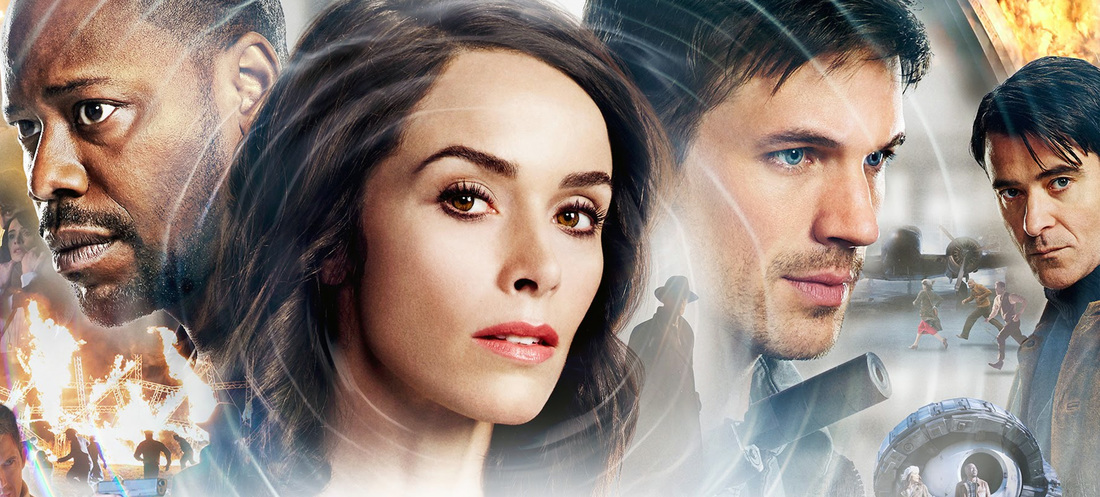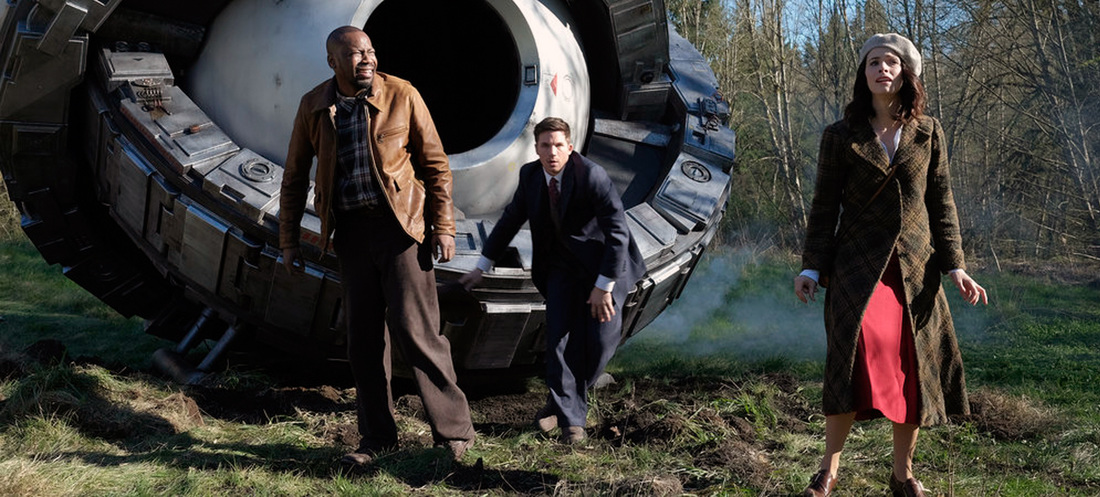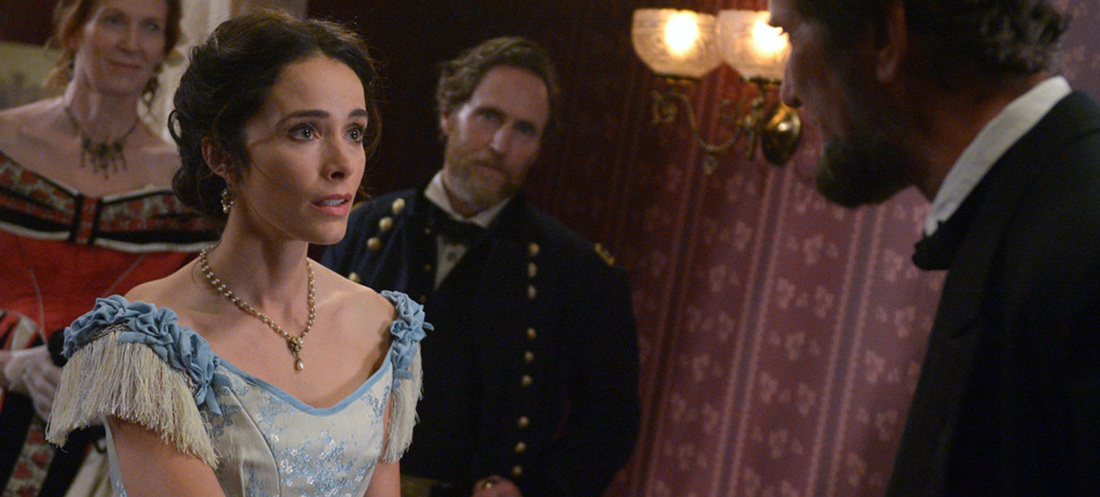Star Trek. The Twilight Zone. Planet of the Apes. Quantum Leap. You name it, and practically every Science Fiction franchise has dabbled in some way, shape, or form in traveling through time (with a few notable exceptions). And … why not? Isn’t there something that’s happened in our own lives that we’d love to go back and correct or – at the very least – change the outcome? That alone is probably one of the reasons why even non-SciFi fans enjoy the occasional time trip, and it’s certainly one of the driving reason television executives are thrilled to put another commodity up for view on the ‘Boob Tube.’ This season has a few new entries into this unique sub-genre, but perhaps the most lauded is NBC’s Timeless.
Coming from Eric Kripke (The CW’s long-running Supernatural) and Shawn Ryan (FX Network’s explosive crooked cop drama, The Shield), Timeless is an action adventure focusing on an unlikely team of heroes – history professor Lucy Preston (the comely Abigail Spencer), Special Forces soldier Wyatt Logan (Matt Lanter), and resident science nerd and timepod pilot Rufus Carlin (the always likeable Malcolm Barrett given a character name that’s CLEARLY a nod to Bill and Ted’s Excellent Adventure). They’re conscripted to a secret government agency and sent through time to stop a criminal mastermind – Garcia Flynn (Goran Visnjic) – who is curiously bent on destroying the past for reasons not quite clearly spelled out (thus far).
As of today’s date, I’ve seen the first three episodes (sadly, I’m not on any media moguls’ emailing list wherein I could receive complimentary advance streaming), and I wanted to sound-off briefly on the show’s prospects … which, at this point, I’d say aren’t all that grand.
Well, the pilot was good, certainly on par with most of what one can find on any television dial these days, but – given both Kripke and Ryan’s participation – I guess I expected something a bit more filling or a little different than what's evolved. Chasing bad guys through time can only go on for so long until audiences start to question where it all can end given the fact that 'anywhere, any time' is an awfully daunting playing field.
Chiefly, the performances of the principles were more than a bit flat.
Spencer’s a curious choice for a series lead: she’s certainly looks the part of a primetime starlet, but her delivery and timing have been inconsistent, some of which could be owed to predictable writing. Lanter – as a leading man – really brings little to the role of Logan; he’s understandably committed like a good soldier to carrying out “the mission” (which kinda/sorta fluctuates a bit with each hour), but the premise has also saddled him with memories of a dead wife, and this gives him good reason to stray from the course. Barrett is the program’s bright spot; he’s a bit of a comic genius -- one who cut his chops on ABC’s Better Off Ted, a sitcom which deserved better treatment from that network -- but he’s spent an awful lot of screen time either reminding us he’s black or maligning history’s overall treatment of “people of color” far too quickly and far too often. Still, his is the only character I care about, so his being a third wheel to two other clunky leads with little to no chemistry opposite one another tests my patience.
In the pilot hour, the team don’t so much save history as they rewrite it to fit the purposes of the adventure (I’m guessing this will somehow be addressed as the program’s greater mythology develops -- there appear to be two agencies with conflicting agendas, but it's too early to tell): Visjnic’s Flynn villainously wants the Hindenburg to crash – just on a different day (relates to its passengers, the audience is led to believe) – but the team successfully gets the airship evacuated. Still, that first hour concluded with a solid hook, the kind of thing audiences look for with smart writing: somehow, Lucy’s present has come undone, removing her kid sister entirely from existence. No doubt, this fuels the woman’s fire to stay committed to putting things back the way they were.
The second hour – the group finds itself in Washington DC the day before President Abraham Lincoln is assassinated – was an improvement though much of the writing still dabbled in areas way too predictable for long term success: Preston stepped up her efforts to be a leader, Logan starts to grasp the bigger possibilities of time travel, and Carlin (sigh) finds himself a somewhat disgraced black Union soldier/imposter. Once again (and perhaps way too soon), Flynn’s intent was to increase history’s body count, but the team thwarts every assassination attempt except that of the 16th President’s death.
The third hour?
Meh. It was a wildly convoluted trip to the early 1960’s involving President Kennedy’s mistress which also involved the theft of plutonium (a sad staple to too many time travel stories) with an open cliffhanger only promising more destruction needing to be averted.
Audiences have to not only care about these people but they have to want to care about them for it's that "connection" that allows them to willingly suspend disbelief on even trivial matters. They'll accept time travel as a storytelling device if (and only if) they see things improved somehow as a consequence, and that's what's missing from Timeless. For these fortunate few, things aren't improving; granted, they may not be getting progressively worse, but they're still not improving.
It isn't Lucy Preston so much as it is caring about Lucy's plight that's missing.
It isn't Wyatt Logan so much as it is caring about the man willing to do anything to turn back time and save his wife.
Similarly, it isn't so much listening to Rufus Carlin's incessant reminders about race and history as it is caring about how his world improves as a consequence of what he sees, learns, and does.
As I said, the only one I care about at this juncture is Rufus. But as his circumstances aren't changing or improving, what really has been changed? Where is the improvement? What has been gained in taking this great adventure? Removing the cause and effect relationship from storytelling on a personal level makes Timeless less of a time travel show and more of a conventional drama, albeit with still disappointing returns.
None of this is meant as a slight to the talents of Spencer or Lanter. In fact, I'd say that they're doing just "fine" with what they've been provided. It's just that their characters just aren’t as compelling as their narrative circumstances … so I’m hoping the writers have a bit more up their sleeves or this is going to get old real fast.
That's certainly no admirable position for a show dealing with time travel!




 RSS Feed
RSS Feed